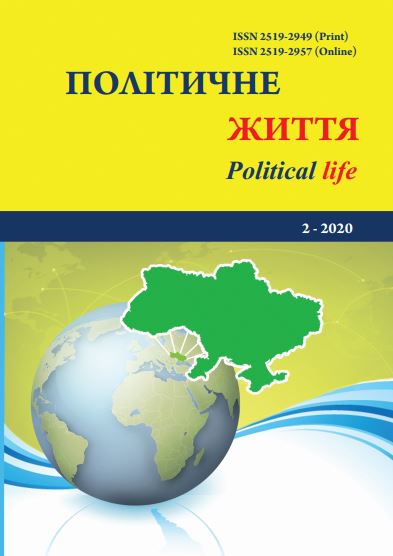The political practices of decommunization in Eastern European countries.
DOI:
https://doi.org/10.31558/2519-2949.2020.2.1Keywords:
decommunization, dictatorship, lustration, acquittal, Eastern EuropeAbstract
The article examines the peculiarities of the denouncement of Communist heritage in Eastern Europe. The practical cases of the Anti-Communist legislation of the Czech Republic and Poland were chosen as the basis for research, their value of their experience for Ukraine was analyzed. The political practices of Romania, Hungary, and the Baltic States were studied as well; their legislation and the reasons
for De-Communization are considered.
According to the critique of Ukrainian De-Communization legislation in the United States and Europe, the study considered foreign “analogues” to Ukrainian laws, determining whether they differ and in which ways. In the scope of the study, differences in the starting conditions for De-Communization and lustration in the countries were identified. A peaceful, negotiated form of transit of power dominated, leaving the perpetrators of criminal actions of the old regimes largely still a part of the society which was experiencing a transition to democracy, and in many cases they even retained the status of political elite, now responsible for abandoning the old political system, in which the former communists were active participants. Both radical (Czech) and moderate (Poland) approaches to lustration were imperfect, due to the lack of documents of the old regime, or incorrect data in these documents. Subsequently, lustrations became an instrument of the political struggle of the right-wing parties against the "new left", the former communists who were able to remain in politics (similar to the political situation in Ukraine).
The research has shown that the process of De-Communization and lustration began with the democratization of public life. Among the factors that affect the success of these processes are: the presence of representatives of the old elite in power, the level of legitimacy of the old regime in the eyes of the population, the level of control over society by the secret police. Most of the studied governments were set up to quickly eliminate the remnants of the “legacy” of Communist dictatorships, while acquitting the members of the resistance to the regime.
Depending on the success and scope of Anti-Communist policies, three groups of countries were identified: full, partial and formal De-Communization. It has been proved that with the delegitimization of the communist past, the first group will expand.
References
Shevel O. Decommunization in Post-Euromaidan Ukraine: Law and Practice. PONARS Eurasia Policy Memo. 2016, January. URL: https://www.researchgate.net/publication/295908426_Decommunization_in_Post-Euromaidan_ Ukraine_Law_and_Practice
Shevel O. “De-Communization Laws” Need to Be Amended to Conform to European Standards. Vox Ukraine. 2015, May 7. URL: https://voxukraine.org/en/de-communization-laws-need-to-be-amended-to-conform-to-european-standards/
Zákon č. 198/1993 Sb. ze dne 9. července 1993 o protiprávnosti komunistického režimu a o odporu proti němu. URL: https://web.archive.org/web/20100724020022/http://www.kpv.kozakov.cz/normy/zakon.htm
. Aviezer Tucker, “Paranoids May Be Persecuted: Post-Totalitarian Retroactive Justice”, Arch. europ. sociol., 40 (1999): с. 56–100.
32. posiedzenie Senatu RP, część 1 stenogramu: Witold Kulesza". senat.gov.pl.
URL: https://web.archive.org/web/20070930194416/http://www.senat.gov.pl/k4/dok/sten/032-t/321g.htm
Мєлєкєсцев К. І., Бут О. М. Україна та Республіка Польща: еволюція від білатеральних відносин до євроатлантичної інтеграції: монографія. Вінниця : ТОВ «ТВОРИ», 2020. – 200 с.
Aleks Szczerbiak, “Dealing with the Communist Past or the Politics of the Present? Lustration
in Post-Communist Poland”, Europe-Asia Studies 54 (2002): с. 533–572.
Sadurski W. “Decommunisation”, “Lustration”, and Constitutional Continuity: Dilemmas of Transitional Justice in Central Europe. European University Institute Working Paper, LAW No. 2003/15, Florence, 2003.
URL: http://hdl.handle.net/1814/1869
Open Letter: Stand with Wojciech Sadurski: his freedom of expression is (y)ours. Gráinne de Búrca, John Morijn, Maximilian Steinbeis. Verfassungsblog – Center for Global Constitutionalism. 18 November 2019.
URL: https://verfassungsblog.de/stand-with-wojciech-sadurski-his-freedom-of-expression-is-yours/
The Republic of Lithuania Code of Administrative Offences. European Public Accountability Mechanisms URL: http://europam.eu/data/mechanisms/PF/PF%20Laws/Lithuania/Lithuania_Code%20of%20administrative %20offences_1985_amended2016_eng.pdf
Atspausdinta iš e-seimas.lrs.lt REPUBLIC OF LITHUANIA LAW ON MEETINGS 2 December 1993
No I-317. Lietuvos Respublikos Seimas. URL: https://e-seimas.lrs.lt/portal/legalActPrint/lt?jfwid=-fxdp8g15&documentId=69fec2a047d411e4ba2fc5e712e90cd4&category=TAD
REPUBLIC OF LITHUANIA LAW ON THE APPROVAL AND ENTRY INTO FORCE OF THE CRIMINAL CODE 26 September 2000 No VIII-1968. Legislation Online. OSCE Office for Democratic Institutions and Human Rights. URL: https://www.legislationline.org/download/id/8272/file/Lithuania_CC_2000_am2017_en.pdf
Decommunization trials in Lithuania and Ukraine, while Russia defends Soviet past. Human Rights in Ukraine. Website of the Kharkiv Human Rights Protection Group. URL: http://khpg.org/en/index.php?id=1509496393
Helga A. Welsh Dealing with the Communist past: Central and East European Experiences after 1990. Europe-Asia Studies, Vol. 48, No. 3 (May, 1996), pp. 413-428. URL: https://www.researchgate.net/publication /240524669_Dealing_with_the_Communist_Past_Central_and_East_European_Experiences_after_1990
Hrynykha A. Ukraine’s De-Communization: Pros and Cons. UkraineWorld. 2019, September 5.
URL: https://ukraineworld.org/articles/reforms/ukraines-de-communization-pros-and-cons
Nedelsky N. “Divergent Responses to a Common Past: Transitional Justice in the Czech Republic
and Slovakia,” Theory and Society 33 (2004): 65–15. URL: https://link.springer.com/article/10.1023/ B:RYSO.0000021428.22638.e2

